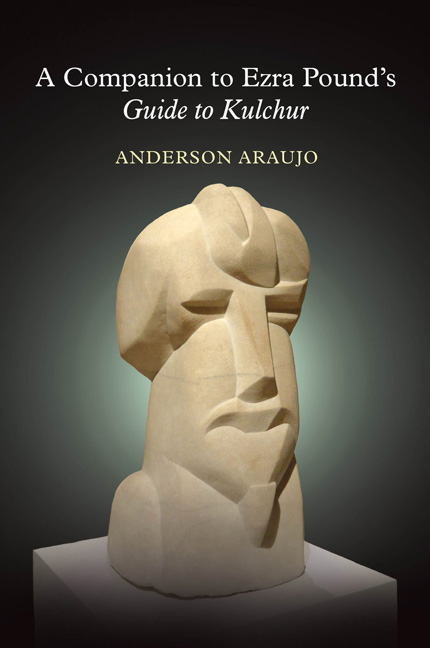Book contents
- Frontmatter
- Contents
- Acknowledgments
- Abbreviations
- Introduction
- Guide to Kulchur
- Part I
- Section I
- Section II
- Part II
- Section III
- Section IV
- Part III
- Section V
- Section VI
- Part IV
- Section VII
- Section VIII
- Section IV
- Part V
- Section X
- Section XI
- 48 Arabia Deserta
- 49 Kung
- 50 Chaucer Was Framed?
- 51 Happy Days
- 52 The Promised Land
- Part VI
- Section XII
- Section XIII
- Addenda: 1952
- Notes
- Index
50 - Chaucer Was Framed?
from Section XI
- Frontmatter
- Contents
- Acknowledgments
- Abbreviations
- Introduction
- Guide to Kulchur
- Part I
- Section I
- Section II
- Part II
- Section III
- Section IV
- Part III
- Section V
- Section VI
- Part IV
- Section VII
- Section VIII
- Section IV
- Part V
- Section X
- Section XI
- 48 Arabia Deserta
- 49 Kung
- 50 Chaucer Was Framed?
- 51 Happy Days
- 52 The Promised Land
- Part VI
- Section XII
- Section XIII
- Addenda: 1952
- Notes
- Index
Summary
That he was slayne … nat but for envye: Excerpt from “The Legend of Ariadne,” in The Legend of Good Women, by the English poet Geoffrey Chaucer (c.1340–1400). The passage alludes to the death of her brother, Androgeus, following the decision of their father Minos, “the mighty kyng of Crete,” to send him to Athens to be educated. The episode reflects Pound's aversion to the “envy of dullards,” who lack “intelletto” (“intellect”), as he says in “Cavalcanti.”
“Adam Bell, Clym of the Clough and Wm. Cloudesley”: An outlaw ballad whose earliest fragments survive from a 1536 edition. The narrative about the exploits of the early modern “gangsters,” Adam, Clim, and William, rivalled the tales of Robin Hood in popularity and commercial success.
“de raptu meo” suit against Chaucer … 24 hours?: The source for Pound's allusion to the rape charge (de raptu meo) brought against Chaucer in 1380 is found in a footnote in the introduction to The Works of Geoffrey Chaucer (1898), edited by University of London professor and bibliographer Alfred W. Pollard (1859–1944). Pound's provocative suggestion that Chaucer may have been “framed” stems from Pollard's claim that on May 1, 1380 Cecilia de Chaumpaigne, the woman who had accused Chaucer, “executed an absolute release to [him] from all liability de meo raptu.” Pound also brings up the bizarre coincidence that on September 6, 1390 Chaucer was robbed twice by the same gang of highwaymen, though at least one of the robbers was eventually discovered and hanged.
Crestien de Troyes: Cf. note GK 107–108.
Beroul: Twelfth-century CE Anglo-Norman writer, author of one of the three surviving versions of the Arthurian romance Tristan and Iseult (c.1160).
Pollard doubts if he knew the Decameron: In his introduction, Pollard hypothesizes that Chaucer was acquainted with Boccaccio's long epic poems Teseide (c.1340) and Il Filostrato (c.1338), the source for Chaucer's Troilus and Criseyde (c. early 1380s), but not with the Decameron (cf. note GK 135).
- Type
- Chapter
- Information
- A Companion to Ezra Pound's Guide to KulcherGuide to Kulcher, pp. 298 - 300Publisher: Liverpool University PressPrint publication year: 2018



